
The Book of Joshua is the sixth book in the Hebrew Bible and the Old Testament, and is the first book of the Deuteronomistic history, the story of Israel from the conquest of Canaan to the Babylonian exile. It tells of the campaigns of the Israelites in central, southern and northern Canaan, the destruction of their enemies, and the division of the land among the Twelve Tribes, framed by two set-piece speeches, the first by God commanding the conquest of the land, and, at the end, the second by Joshua warning of the need for faithful observance of the Law (torah) revealed to Moses.
The Book of Numbers is the fourth book of the Hebrew Bible and the fourth of five books of the Jewish Torah. The book has a long and complex history; its final form is possibly due to a Priestly redaction of a Yahwistic source made sometime in the early Persian period. The name of the book comes from the two censuses taken of the Israelites.

Joshua, also known as Yehoshua, Jehoshua, or Josue, functioned as Moses' assistant in the books of Exodus and Numbers, and later succeeded Moses as leader of the Israelite tribes in the Book of Joshua of the Hebrew Bible. His name was Hoshea the son of Nun, of the tribe of Ephraim, but Moses called him "Yehoshua", the name by which he is commonly known in English. According to the Bible, he was born in Egypt prior to the Exodus.

Balaam, son of Beor, was a biblical character, a non-Israelite prophet and diviner who lived in Pethor, a place identified with the ancient city of Pitru, thought to have been located between the region of Iraq and northern Syria in what is now southeastern Turkey. According to chapters 22-24 of the Book of Numbers, he was hired by King Balak of Moab to curse Israel, but instead he blessed the Israelites, as dictated by God. Subsequently, the plan to entice the Israelites into idol worship and sexual immorality is attributed to him. Balaam is also mentioned in the Book of Micah.
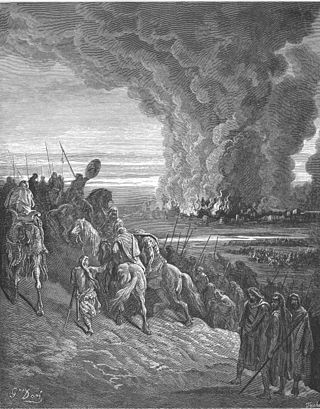
The Ai was a city in Canaan, mentioned in the Hebrew Bible. According to the Book of Joshua, it was conquered by the Israelites, headed by Joshua, during their conquest of Canaan.

Wisdom Tree, Inc. is an American developer of Christian video games. It was an offshoot of Color Dreams, one of the first companies to work around Nintendo's 10NES lockout chip technology for the Nintendo Entertainment System. Color Dreams formed the Wisdom Tree subsidiary in 1990 in an effort to circumvent Nintendo's restrictions against publishers of unlicensed video games for the NES by selling their games at Christian book stores which was not subject to pressure by Nintendo.
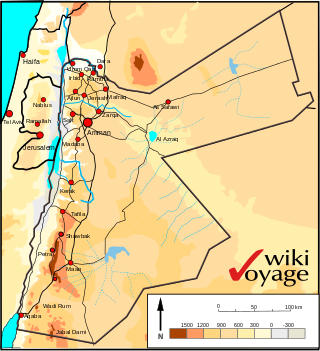
Mount Seir is the ancient and biblical name for a mountainous region stretching between the Dead Sea and the Gulf of Aqaba in the northwestern region of Edom and southeast of the Kingdom of Judah. It may also have marked the older historical limit of Ancient Egypt in Canaan. A place called "Seir, in the land of Shasu", thought to be near Petra, Jordan, is listed in the temple of Amenhotep III at Soleb.
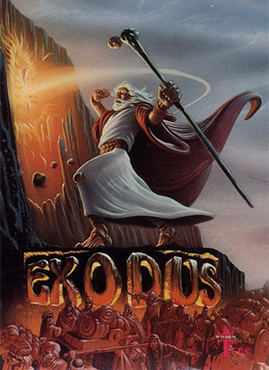
Exodus is a video game released for the Nintendo Entertainment System by Color Dreams through its Wisdom Tree label in 1991. Like all Wisdom Tree games, Exodus was not officially licensed by Nintendo. It was ported to the Game Boy. Exodus is based on Crystal Mines, an earlier game from the company when it was known as Color Dreams.

Spiritual Warfare is a 1992 Christian video game developed by Wisdom Tree for the Nintendo Entertainment System, it was later ported to MS-DOS, Game Boy, and Sega Genesis, and re-released as a part of the Spiritual Warfare & Wisdom Tree Collection in 2017 on Steam for Microsoft Windows, Mac OS X, and Linux. The game was not officially licensed by Nintendo for the NES, so it was mostly sold in Christian bookstores instead of traditional video game retailers.
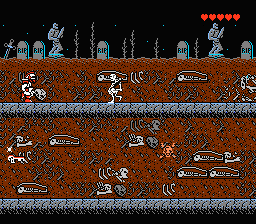
Color Dreams is an American company formerly known for developing and publishing unlicensed video games for the 8-bit Nintendo Entertainment System (NES). The company left the video game industry in the mid-1990s, shifting its focus to IP cameras and related surveillance equipment.
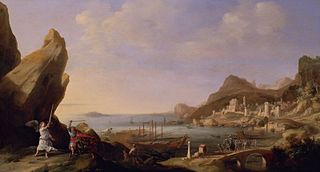
Balak is the 40th weekly Torah portion in the annual Jewish cycle of Torah reading and the seventh in the Book of Numbers. In the parashah, Balak son of Zippor, king of Moab, tries to hire Balaam to curse Israel, Balaam's donkey speaks to Balaam, and Balaam blesses Israel instead. The parashah constitutes Numbers 22:2–25:9. The parashah is made up of 5,357 Hebrew letters, 1,455 Hebrew words, 104 verses, and 178 lines in a Torah Scroll.

According to the Hebrew Bible, Phinehas was a priest during the Israelites' Exodus journey. The grandson of Aaron and son of Eleazar, the High Priests, he distinguished himself as a youth at Shittim with his zeal against the heresy of Peor.

The Hebrew Bible and the New Testament both contain narratives, poems, and instructions which describe, encourage, command, condemn, reward, punish and regulate violent actions by God, individuals, groups, governments, and nation-states. Among the violent acts referred to are war, human sacrifice, animal sacrifice, murder, rape, genocide, and criminal punishment. Violence is defined around four main areas: that which damages the environment, dishonest or oppressive speech, and issues of justice and purity. War is a special category of violence that is addressed in four different ways including pacifism, non-resistance, just war and crusade.
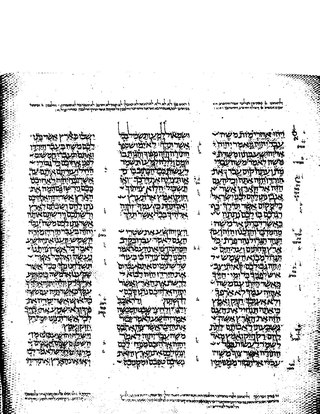
Joshua 6 is the sixth chapter of the Book of Joshua in the Hebrew Bible or in the Old Testament of the Christian Bible. According to Jewish tradition the book was attributed to Joshua, with additions by the high priests Eleazar and Phinehas, but modern scholars view it as part of the Deuteronomistic History, which spans the books of Deuteronomy to 2 Kings, attributed to nationalistic and devotedly Yahwistic writers during the time of the reformer Judean king Josiah in 7th century BCE. This chapter focuses on the Battle of Jericho under the leadership of Joshua, a part of a section comprising Joshua 5:13–12:24 about the conquest of Canaan.

Numbers 31 is the 31st chapter of the Book of Numbers, the fourth book of the Pentateuch (Torah), the central part of the Hebrew Bible, a sacred text in Judaism and Christianity. Scholars such as Israel Knohl and Dennis T. Olson name this chapter the War against the Midianites.
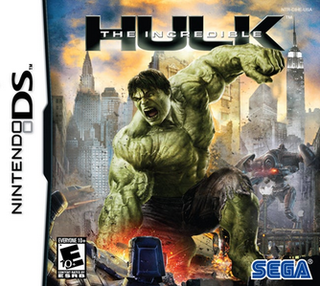
The Incredible Hulk is a 2008 video game published by Sega and developed by The Fizz Factor for the Nintendo DS. It is based on the film of the same name, following scientist Bruce Banner as he traverses across the Americas in search of a cure to a condition that transforms him into a monstrous being known as the Hulk. Unlike the console game that was concurrently developed and released by Edge of Reality, The Incredible Hulk is presented as a side-scrolling platformer rather than an open world action-adventure title.

Joshua 24 is the twenty-fourth chapter of the Book of Joshua in the Hebrew Bible or in the Old Testament of the Christian Bible. According to Jewish tradition the book was attributed to Joshua, with additions by the high priests Eleazar and Phinehas, but modern scholars view it as part of the Deuteronomistic History, which spans the books of Deuteronomy to 2 Kings, attributed to nationalistic and devotedly Yahwistic writers during the time of the reformer Judean king Josiah in 7th century BCE. This chapter records Joshua's final address to the people of Israel, that ends with a renewal of the covenant with YHWH, and the appendices of the book, a part of a section comprising Joshua 22:1–24:33 about the Israelites preparing for life in the land of Canaan.
War in the Hebrew Bible concerns any military engagement narrated or discussed in the Hebrew Bible, also known as the Tanakh or Old Testament of the Bible. Texts about war in the Hebrew Bible are part of the broader topic of The Bible and violence. They cover a wide range of topics from detailed battle reports including weapons and tactics used, numbers of combatants involved, and casualties experienced, to discussions of motives and justifications for war, the sacred and secular aspects of war, descriptions and considerations of what in the modern era would be considered war crimes, such as genocide or wartime sexual violence, and reflections on wars that have happened, or predictions, visions or imaginations of wars that are yet to come.

Joshua 5 is the fifth chapter of the Book of Joshua in the Hebrew Bible or in the Old Testament of the Christian Bible. According to Jewish tradition, the book was attributed to Joshua, with additions by the high priests Eleazar and Phinehas, but modern scholars view it as part of the Deuteronomistic History, which spans the books of Deuteronomy to 2 Kings, attributed to nationalistic and devotedly Yahwistic writers during the time of the reformer Judean king Josiah in 7th century BCE. This chapter focuses on the circumcision and Passover of the Israelites after crossing the Jordan River under the leadership of Joshua, a part of a section comprising Joshua 1:1–5:12 about the entry to the land of Canaan, and the meeting of Joshua with the Commander of the Lord's army near















